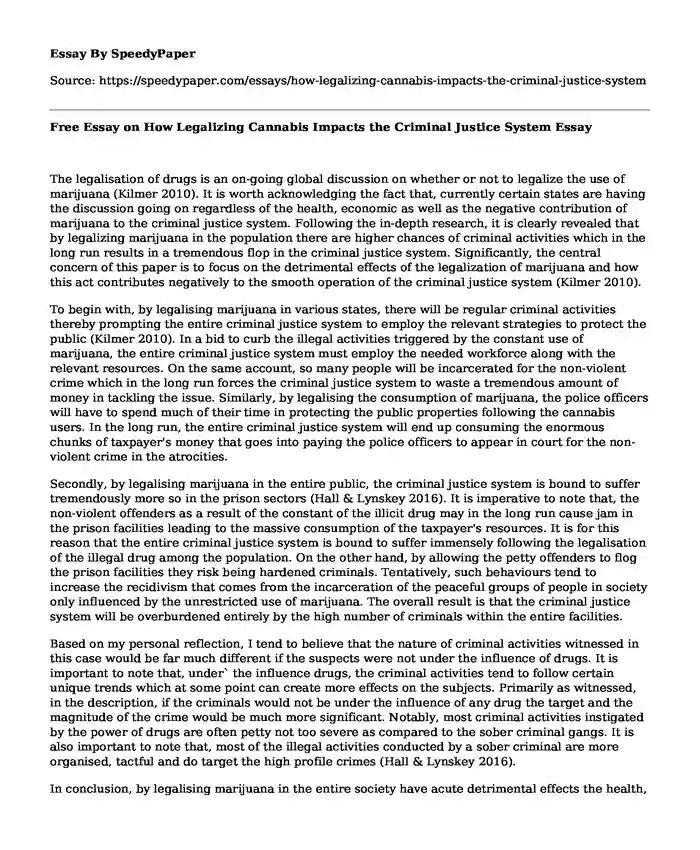
| Type of paper: | Essay |
| Categories: | Marijuana legalization Criminal justice |
| Pages: | 3 |
| Wordcount: | 713 words |
The legalisation of drugs is an on-going global discussion on whether or not to legalize the use of marijuana (Kilmer 2010). It is worth acknowledging the fact that, currently certain states are having the discussion going on regardless of the health, economic as well as the negative contribution of marijuana to the criminal justice system. Following the in-depth research, it is clearly revealed that by legalizing marijuana in the population there are higher chances of criminal activities which in the long run results in a tremendous flop in the criminal justice system. Significantly, the central concern of this paper is to focus on the detrimental effects of the legalization of marijuana and how this act contributes negatively to the smooth operation of the criminal justice system (Kilmer 2010).
To begin with, by legalising marijuana in various states, there will be regular criminal activities thereby prompting the entire criminal justice system to employ the relevant strategies to protect the public (Kilmer 2010). In a bid to curb the illegal activities triggered by the constant use of marijuana, the entire criminal justice system must employ the needed workforce along with the relevant resources. On the same account, so many people will be incarcerated for the non-violent crime which in the long run forces the criminal justice system to waste a tremendous amount of money in tackling the issue. Similarly, by legalising the consumption of marijuana, the police officers will have to spend much of their time in protecting the public properties following the cannabis users. In the long run, the entire criminal justice system will end up consuming the enormous chunks of taxpayer's money that goes into paying the police officers to appear in court for the non-violent crime in the atrocities.
Secondly, by legalising marijuana in the entire public, the criminal justice system is bound to suffer tremendously more so in the prison sectors (Hall & Lynskey 2016). It is imperative to note that, the non-violent offenders as a result of the constant of the illicit drug may in the long run cause jam in the prison facilities leading to the massive consumption of the taxpayer's resources. It is for this reason that the entire criminal justice system is bound to suffer immensely following the legalisation of the illegal drug among the population. On the other hand, by allowing the petty offenders to flog the prison facilities they risk being hardened criminals. Tentatively, such behaviours tend to increase the recidivism that comes from the incarceration of the peaceful groups of people in society only influenced by the unrestricted use of marijuana. The overall result is that the criminal justice system will be overburdened entirely by the high number of criminals within the entire facilities.
Based on my personal reflection, I tend to believe that the nature of criminal activities witnessed in this case would be far much different if the suspects were not under the influence of drugs. It is important to note that, under` the influence drugs, the criminal activities tend to follow certain unique trends which at some point can create more effects on the subjects. Primarily as witnessed, in the description, if the criminals would not be under the influence of any drug the target and the magnitude of the crime would be much more significant. Notably, most criminal activities instigated by the power of drugs are often petty not too severe as compared to the sober criminal gangs. It is also important to note that, most of the illegal activities conducted by a sober criminal are more organised, tactful and do target the high profile crimes (Hall & Lynskey 2016).
In conclusion, by legalising marijuana in the entire society have acute detrimental effects the health, social, economic as well as the criminal justice system. Apparently, in the long run, the incarceration of the non-violent offender would rapidly increase within a short period thereby increasing the overall expenditure in the in the entire criminal justice system (Hall & Lynskey 2016).
References
Kilmer, B., Caulkins, J. P., Pacula, R. L., MacCoun, R. J., & Reuter, P. (2010). Altered state?: Assessing how marijuana legalisation in California could influence marijuana consumption and public budgets. Santa Monica, CA: RAND.
Hall, W., & Lynskey, M. (2016). Evaluating the public health impacts of legalising recreational cannabis use in the United States. Addiction, 111(10), 1764-1773.
Cite this page
Free Essay on How Legalizing Cannabis Impacts the Criminal Justice System. (2022, Oct 24). Retrieved from https://speedypaper.com/essays/how-legalizing-cannabis-impacts-the-criminal-justice-system
Request Removal
If you are the original author of this essay and no longer wish to have it published on the SpeedyPaper website, please click below to request its removal:
- Forensic Psychological Report, Free Essay for You
- Free Essay Sample: Ethics and Business
- Free Essay that Contains a Business Plan for Room for Dessert
- Essay Sample about Marketing Implications of Population Changes
- Free Essay. Visual Perceptions, Principles, and Importance of Principles
- Free Essay: Character Analysis of the Short Story Everyday Use by Alice Walker
- Social Justice Cause - Free Paper Sample
Popular categories




